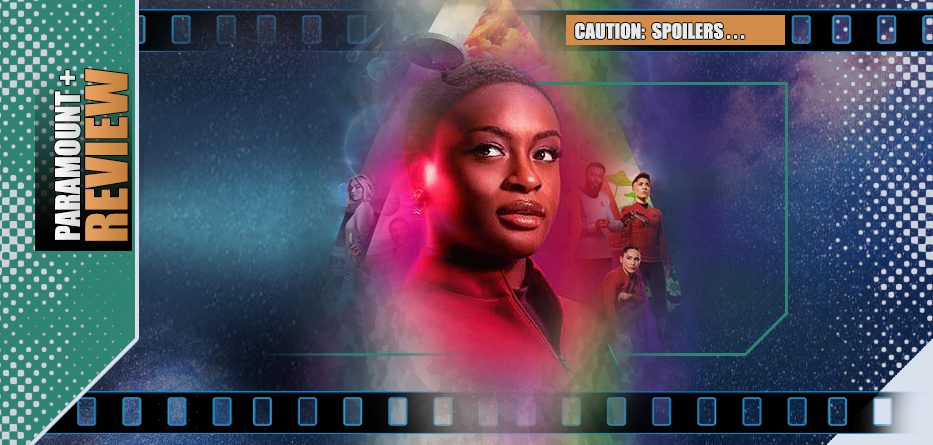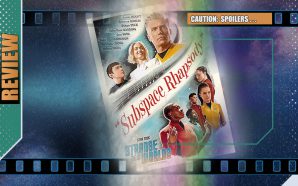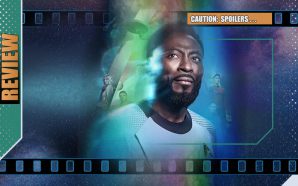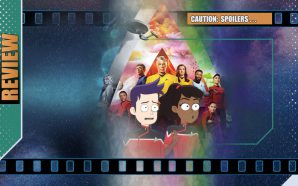Nyota Uhura has been working hard for several days on the Enterprise’s mission to investigate delays on an important dilithium refinery on the edge of Federation space. She’s had minimal rest, so when she hears a strange sound that no-one else in the crew notices, she (and they) put it down to her needing sleep. Yet Uhura keeps hearing the grating sound and it starts to be accompanied by strange and quite horrifying visions. She sees a lumbering zombie-like figure of the late Chief Engineer Hemmer and images of the crew murdered… then a disastorous fracturing of the bridge. Concerns grow that Uhura must have some undiagnoseed condition, perhaps linked to stress and fatigue, but M’Benga cannot isolate anything beyond the obvious.
As the visions intensify, even leading to an assault on the visiting James T. Kirk, it is also discovered that the delays on the refinery may have been caused by sabotage. Is Uhura’s condition linked to those actions on the refinery and if so, what is that link… and how drastic could the solution be?
*spoilers*
Though she hasn’t dominated proceedings in the same way that say, Michael Burnham has in the supposedly-ensemble Discovery, the character of Uhura is one that from Strange New World‘s outset, the show has been to develop. Over the years much has been made of the central male characters of the wider Trek franchise but even now that Uhura has a used first-name (Nyota) it is not in the same Lexicon as ‘James T’ etc. Strange New Worlds has definitely embraced the ensemble aspect and looked to expand what we know of the communications officer (originally essayed in TOS by the late Nichelle Nichols) and has done so by integrating her into the lives of her fellow core crew.
In Lost in Translation‘s climax, Uhura’s leap, connecting the meaning of the imagery she’s seen in her visions with an almost empathic logic, seems a wholly intuitive one, not immediately obvious (even to the audience) but is required for the resolution to work. It might be down to Celia Rose Gooding’s performance and growing, fully-rounded characterisaiton that ultimately sells it, but it’s still a bit of a narrative stretch. The problem is, even as an audience who knows more and wants to believe Uhura’s deductions, we’re likely a little uneasy on Pike just doing the same. While there is definitely a case of circumstantial evidence beginning to mount up for him to consider in her favour, but would a Captain really take the can’t-be-backed-up instincts of his communications officer and blow up a few billion dollars worth of refinery on her word alone? Honestly, if I was an onlooker I could think of several other scenarios and reasonings that I’d want to try first… and I hope it’s a decision that – realistically – is somewhat held against Pike by his superiors who would be likely to drag him over the dilithium coals for such an (apparently) impulsive command decision.
Paul Wesley’s younger James T. Kirk has been something of a marmite role for the audience – with some loving and some disliking his interpretation. For me it’s neither bad not great… the actor is fine in a role that could have been an ill-judged disaster and Wesley has wisely not tried to imitate William Shatner’s original and culturally iconic style. But neither has he quite made it his own to the extent that Ethan Peck has captured the essence of Spock. It’s partially down to the writing which seems eager to make Kirk a flirtatious rather than charismatic officer, but one that’s still hard to pin down as yet having a strong dynamic. Young Kirk is highly ambitious (as seen by his fraternal friction with his brother Sam played by Dan Jeannotte) and certainly innately brave and loyal to those he seeks to help, but in the appearances he’s made he’s more reactive than active and doesn’t yet have the physical or command weight… it’s hard to picture him giving an order that someone would follow without question which is something Anson Mount’s Pike manages with ease. The episode sees him enjoying the company of Uhura in a possibly purely platonic way and skirts nervously around the issue of La’an’s conflicted emotions given that she watched an alternate version of him die in her arms. But I’m not sure what the show wants to do with Kirk this early in the run and, truthfully, I’m not sure that the powers-that-be do either.
That being said, I do like that the episode finishes up with Uhura, Spock and Kirk sitting talking at a table – in many ways innocuous and quite pedestrian scene but one that informs the audience that it is the start of the longer road and journey that we know they will eventually undertake together.
Elsewhere, I’m still not sure about Carol Kane’s Pelia, a character that still feels like someone inserted her specifically to be a messier ‘Guinan’ figure but hasn’t quite set out beyond that singular description. There’s some cursory scenes with Rebecca Romijn’s Una which are supposedly grounded in the fact that Pelia has been around ten times the length of Una’s service, but that Una out-ranks her and still hasn’t forgiven her for a bad mark in class. It all turns out to be more about Una missing Hemmer (the series a regular and Chief Engineer played by Bruce Horak) whom Pelia replaced. it doesn’t quite work as a reasoning and though it’s great to see Horak reprising his beloved role, it works better when linked directly to Uhura with whom he worked so closely. We also get to see Jess Bush’s Nurse Christine Chapel and Ethan Peck’s Spock address the complications of their relationship, deciding they shouldn’t inform anyone on an official level as it might complicate things before they’ve even really started. Yup, that’s going to come back to bite them.
A solid episode for Strange New Worlds after several weeks of coasting – effectively, but less interestingly – on its well-deserved reputation…
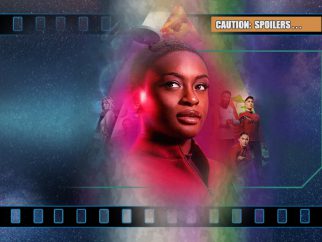
- Story7
- Acting8
- Direction8
- Production Design / VFX8
- Nostalgic factor9

